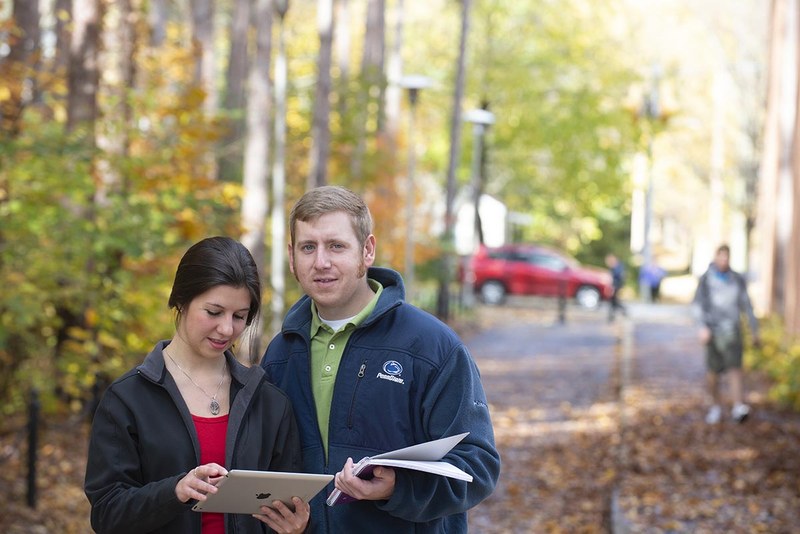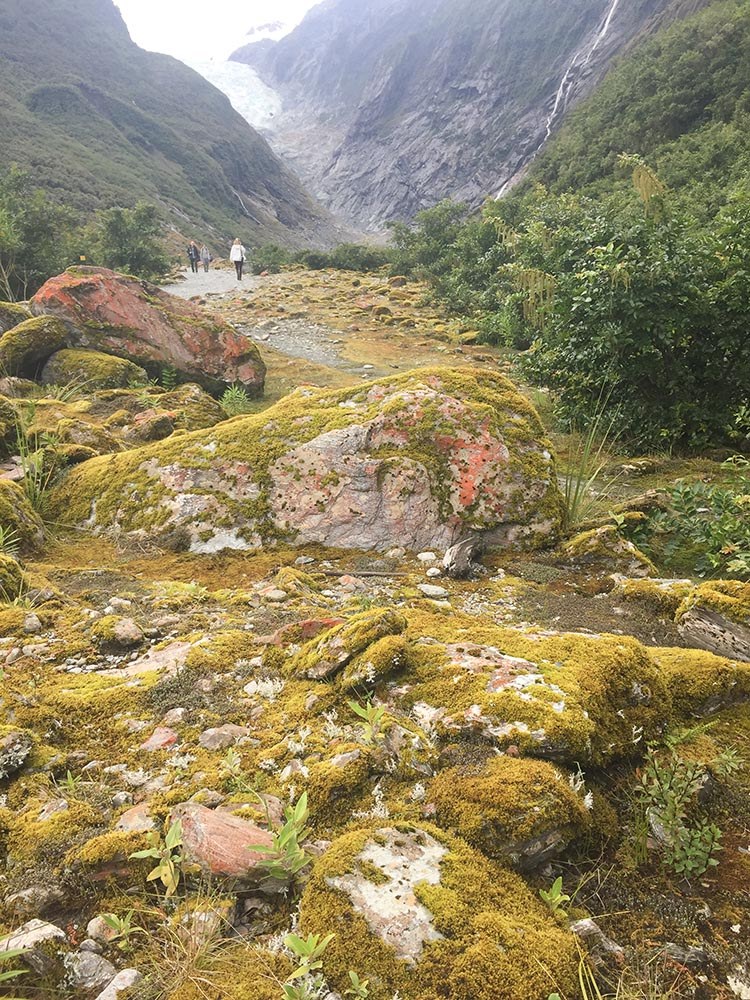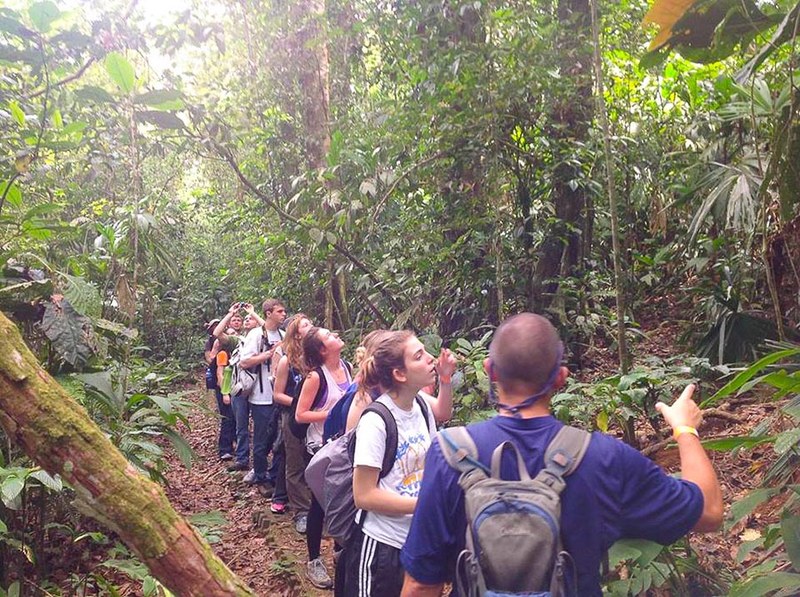Forest Ecosystem Management Major
Sustain the forest.
A hands-on science and management education in sustainable forestry. Forest Ecosystem Management grads take leadership roles in private companies, nonprofits, and government agencies.
Lessons from professors, trees, and satellites.
Your Forest Ecosystem Management adventure starts on campus and moves quickly to the millions of acres of Pennsylvania forests where you will learn and one day work in your profession. Forest Ecosystem Management requires boots on the ground to study the soils, water, animals, and plants that make up our woodlands. There are more than 9,000 acres of forested acres, outdoor laboratories, and research plots at or near University Park.
This science-based major focuses on ecology and management and incorporates cutting-edge technologies. Penn State is at the forefront of using innovative tools like LIDAR (Light Detection and Ranging), satellite imagery, and UAVs to understand and conserve our forests.
Forest Ecosystem Management is the right major if you’re:
- someone with an analytical mind to manage complex ecological systems and resolve environmental, economic, and social challenges
- a hands-on learner
- happiest outside
- a disciplined, focused student
- driven to improve the sustainability and health of our forest lands
Required courses
- Field Dendrology
- Forest Resources Measurements
- Intro to GIS and GPS
- Forest Ecology
- Silviculture
See the University Bulletin for details on program requirements, suggested academic plan, and more.
See our department's Statement on Diversity and Inclusion.

We provide several options that are accredited by the Society of American Foresters (SAF). The SAF advances sustainable management of forest resources and promotes professional excellence. The SAF Code of Ethics guides its members and Penn State was among the first groups of forestry programs accredited by SAF in 1935. Learn more about our Forest Ecosystem Management students and graduates.
Ag Journeys
“Find the tree Zen and trust yourself.”
– Kayley (Kay) Henninger

More than the syllabus.
At Penn State, there are more opportunities to learn, meet professionals working in your field, network, and have fun than you can imagine.
The same goes with our internship opportunities. Companies compete to bring Penn Staters on board for the summer, and many students return to campus with a summer of practical experience and often a job offer waiting in the wings. There are research opportunities, study abroad opportunities, and more to gain experience and academic credit.
Craft your experience.
Related clubs and teams
- Society of American Foresters (SAF)
- Penn State Fly Fishing
- Penn State Student Association for Fire Ecology
- Penn State Spur Collectors
- Penn State Lumber Lions
- Student Farm
- The Wildlife Society
- See all clubs and teams
Recent internships
- Biological science technician
- Forestry intern
- Habitat management internship
- Invasive species intern
- Urban forestry intern
Popular study abroad
- Australian National University at Canberra
- South Africa Study Tour
- University of Freiburg, Germany




A practical, workforce-ready degree—and a college experience you’ll love.
Penn State Forest Ecosystem Management graduates are in the woods, at the office, out on the job, and across the globe, right now.
Our alumni out in the world
- Land management agencies
- State forests and parks
- Conservation districts
- Forest products companies
- Environmental consulting firms
- Tree care industry
- Municipal watersheds
- and more!
Forest Ecosystem Management Career Options
Here is a glimpse into the variety of careers and other pathways you might pursue with a degree in Forest Ecosystem Management. Our students have access to powerful career resources to help prepare for an amazing career!
Agroforester
Agroforesters plan the careful integration of trees and other woody plants that provide ecological and environmental services. They focus on providing an improved and sustainable mix of agricultural and forest crops.
Arborist
Arborists ensure the health and beauty of trees and woody plants. They consult with clients and develop and implement plans to manage landscape trees and shrubs.
Botanist
Botanists are plant biologists who focus their work on a variety of aspects of plant life. They apply science and management skills and expertise to conserve and manage plant resources and plant biodiversity in forested areas.
Conservation Biologist
Conservation biologists conduct research and education to restore and protect natural ecosystems and to sustain forest ecosystem services including nontimber products and carbon storage.
Consulting Forester
A consulting forester provide forest management services to private citizens, municipalities, businesses, and other entities that own forestland.
Fire Ecologist
Fire ecologists examine the interactions between fire and ecosystem attributes (plants, animals, nutrients, water, etc.) to support the management of fire-adapted ecosystems and the mitigation of ecological damage from wildfires. Combine ecological knowledge with fire science to support the planning of prescribed burning, fuels management, and the management of post-wildfire landscapes.
Forest Ecologist
Forest ecologists examine the interactions between forest organisms and their environment to support decision making to meet forest management objectives and mitigate potential environmental impacts.
Forest Manager
A forest manager plans and supervises activities such as reforestation, harvesting, insect and disease control, fire protection, wildlife habitat management, and forest recreation. They ensure the health and productivity of forested lands in the face of current challenges such as climate change and invasive species.
Forest Technician
Forest technicians assist in a variety of forest management activities such as marking boundaries, preparing timber sales, controlling insects/disease, conducting prescribed fires, and improving wildlife habitat.
Geographic Information System (GIS) Analyst
GIS analysts collect and use data to produce maps and inform science-backed decisions about land use.
Industrial Forester
Industrial foresters manage land owned by forest products companies and/or work with private landowners to ensure a sustainable supply of raw material required for company operations.
Park Ranger
A ranger with law enforcement duties enforces rules and regulations to promote compliance and safety for park visitors and protects and preserves natural resources. Rangers with education responsibilities present educational programs and demonstrations, create and maintain educational exhibits, and facilitate public understanding of the splendor and fragility of our shared natural spaces.
Service Forester
Service foresters inform and advise managers of rural and community forests, landowners, and the public in support of sustainable forest management.
Utility Forester
A utility forester inspects, evaluates, and manages vegetation along utility lines; resolves potential hazards; oversees tree crews; and consults with customers.
Watershed Forester
A watershed forester monitors, protects, and enhances water quality in forested areas, and collects and interprets hydrologic data.
Wildland Firefighter
A wildland firefighter's responsibilities include wildland fire suppression, prescribed fire planning and execution, fuels management, fire hazard mitigation, and fire prevention.
Advanced Degrees
FOREM is a great foundation for master's and doctoral programs in the life sciences in preparation for careers in science, government, education, and more. Additionally, FOREM graduates find they are well prepared to pursue law, medicine, business, and other professional paths.
Forest Ecosystem Management Students in the News
September 11, 2024
Forest ecosystem management student helps fight fires in Montana
Camryn Hornbaker, a Penn State senior majoring in forest ecosystem management, was part of a wildland firefighting crew that spent two weeks supporting firefighting efforts in eastern Montana.
Read More
January 30, 2024
Aspiring natural resource professionals showcase skills in Dendro Cup contest
On a brisk afternoon in December, students in a forestry course in Penn State’s College of Agricultural Sciences ventured into a wooded field on the University Park campus, eager to discover woody plant specimens and claim bragging rights in the second annual Dendro Cup competition. Designed by instructors Eric Burkhart and Calvin Norman, the competition evaluates the expertise gained by students in the morning and afternoon sections of their fall semester field dendrology course.
Read More
September 7, 2023
Course at Penn State gives students hands-on wildland fire management training
This spring, five students in Penn State’s College of Agricultural Sciences traveled to North Carolina and Florida to learn about wildland fire management and fire ecology techniques.
Read More
December 2, 2022
Internships earn awards for College of Agricultural Sciences students
Twelve Penn State students have been selected as College of Agricultural Sciences Alumni Society 2022 Internship Award winners. The award, which includes a $1,000 stipend, was established to encourage students to participate in a credit or noncredit educational internship program related to their field of study.
Read More






